HRM 6 MBA Assignment: HRM Activities, Effectiveness, and Global Impact
VerifiedAdded on 2022/11/14
|7
|2331
|320
Essay
AI Summary
This essay delves into the multifaceted realm of Human Resource Management (HRM), exploring the significance of employee involvement in HR activities. It examines the competencies of an effective HRM manager, the stages of international business expansion, and the consequent impact on HR functions. The essay contrasts domestic and international HRM, providing relevant examples to illustrate key differences. It further offers recommendations to enhance HRM practices and promote organizational growth, emphasizing the importance of aligning HR strategies with organizational goals. The discussion covers various aspects of global business, including export, sales subsidiaries, and the development of human resources in different countries, highlighting the complexities and risks associated with international HRM compared to its domestic counterpart. In conclusion, the essay underscores the evolving nature of HRM in a globalized business environment, advocating for adaptive strategies to achieve sustained organizational success.
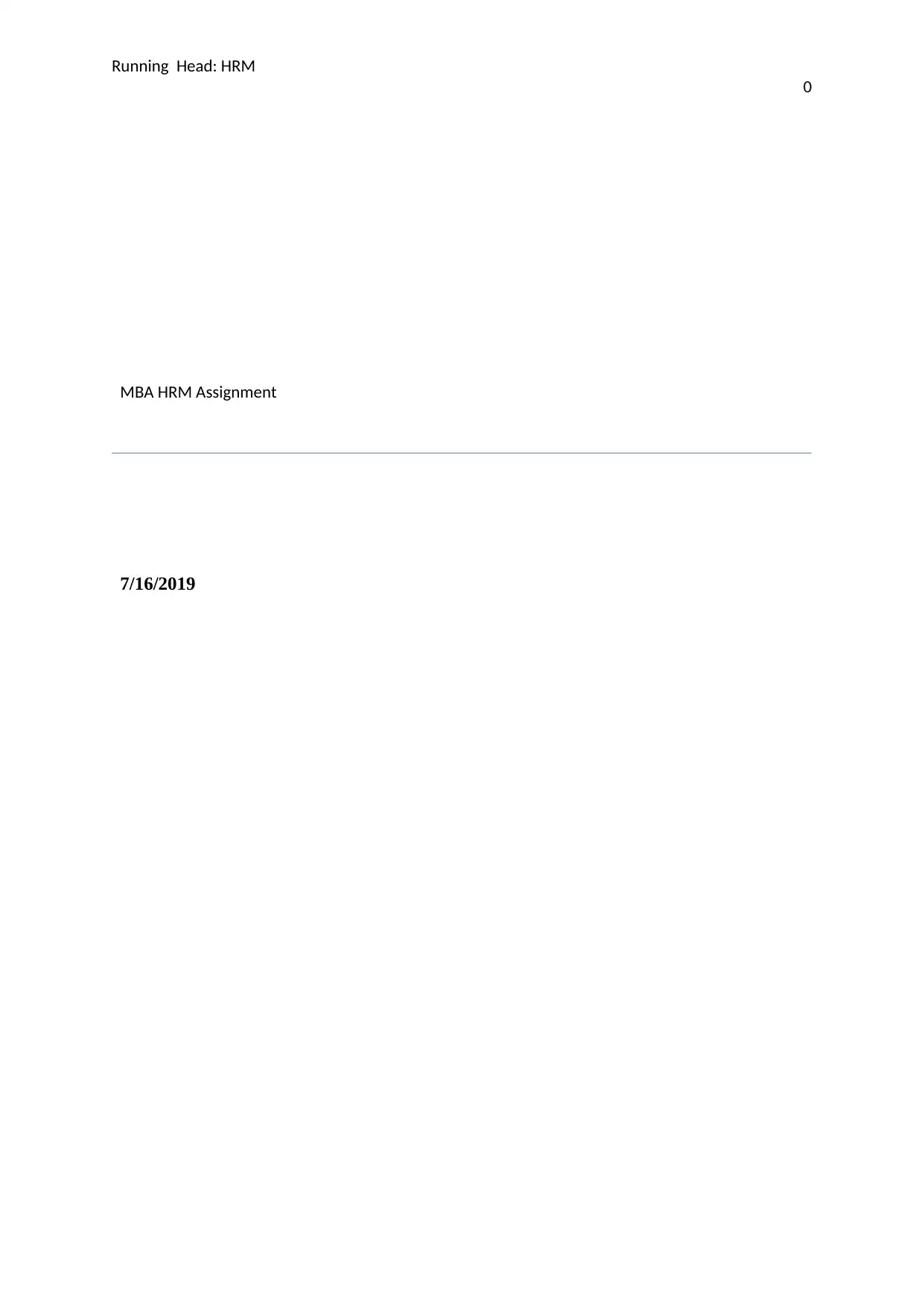
Running Head: HRM
0
MBA HRM Assignment
7/16/2019
0
MBA HRM Assignment
7/16/2019
Paraphrase This Document
Need a fresh take? Get an instant paraphrase of this document with our AI Paraphraser
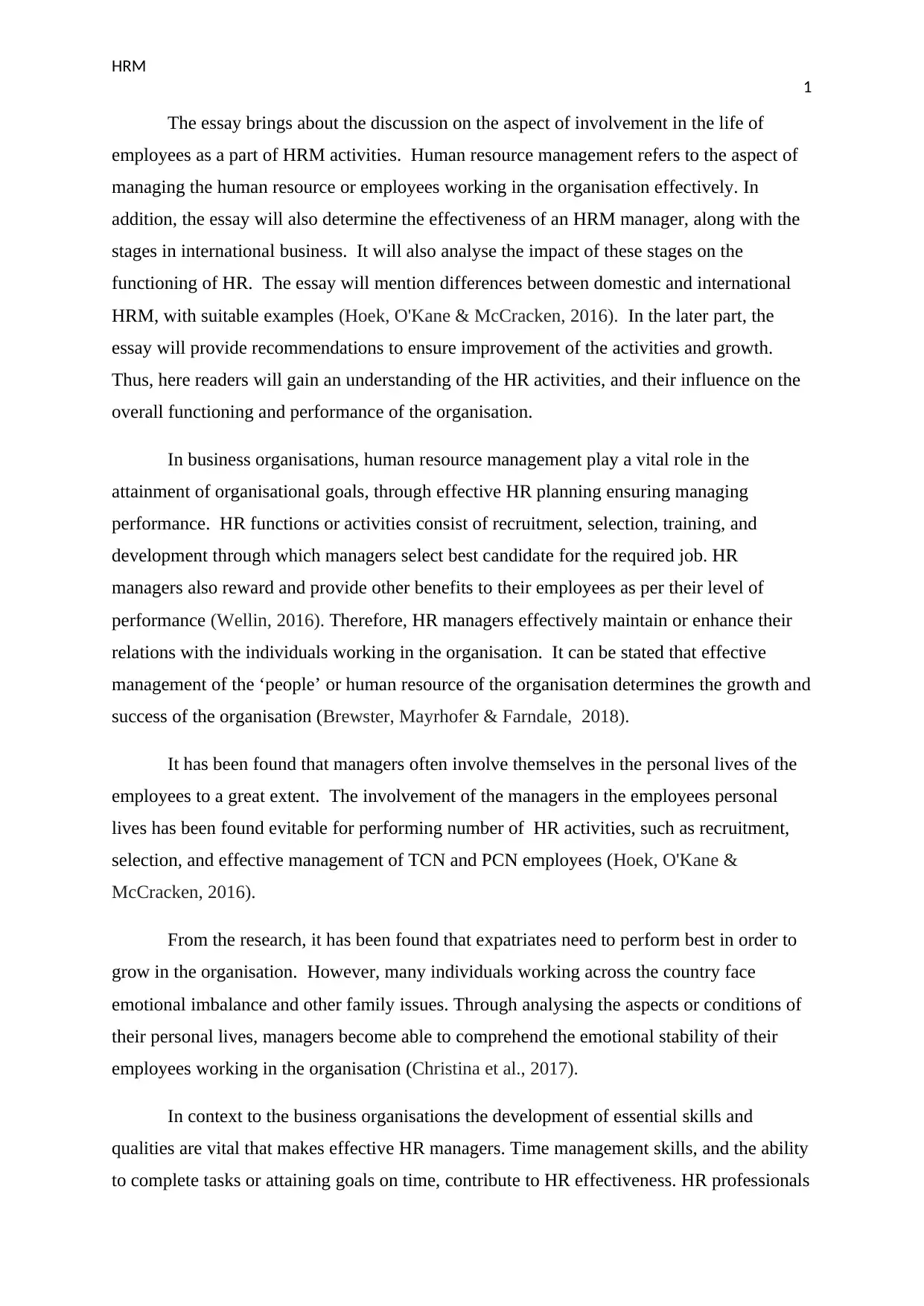
HRM
1
The essay brings about the discussion on the aspect of involvement in the life of
employees as a part of HRM activities. Human resource management refers to the aspect of
managing the human resource or employees working in the organisation effectively. In
addition, the essay will also determine the effectiveness of an HRM manager, along with the
stages in international business. It will also analyse the impact of these stages on the
functioning of HR. The essay will mention differences between domestic and international
HRM, with suitable examples (Hoek, O'Kane & McCracken, 2016). In the later part, the
essay will provide recommendations to ensure improvement of the activities and growth.
Thus, here readers will gain an understanding of the HR activities, and their influence on the
overall functioning and performance of the organisation.
In business organisations, human resource management play a vital role in the
attainment of organisational goals, through effective HR planning ensuring managing
performance. HR functions or activities consist of recruitment, selection, training, and
development through which managers select best candidate for the required job. HR
managers also reward and provide other benefits to their employees as per their level of
performance (Wellin, 2016). Therefore, HR managers effectively maintain or enhance their
relations with the individuals working in the organisation. It can be stated that effective
management of the ‘people’ or human resource of the organisation determines the growth and
success of the organisation (Brewster, Mayrhofer & Farndale, 2018).
It has been found that managers often involve themselves in the personal lives of the
employees to a great extent. The involvement of the managers in the employees personal
lives has been found evitable for performing number of HR activities, such as recruitment,
selection, and effective management of TCN and PCN employees (Hoek, O'Kane &
McCracken, 2016).
From the research, it has been found that expatriates need to perform best in order to
grow in the organisation. However, many individuals working across the country face
emotional imbalance and other family issues. Through analysing the aspects or conditions of
their personal lives, managers become able to comprehend the emotional stability of their
employees working in the organisation (Christina et al., 2017).
In context to the business organisations the development of essential skills and
qualities are vital that makes effective HR managers. Time management skills, and the ability
to complete tasks or attaining goals on time, contribute to HR effectiveness. HR professionals
1
The essay brings about the discussion on the aspect of involvement in the life of
employees as a part of HRM activities. Human resource management refers to the aspect of
managing the human resource or employees working in the organisation effectively. In
addition, the essay will also determine the effectiveness of an HRM manager, along with the
stages in international business. It will also analyse the impact of these stages on the
functioning of HR. The essay will mention differences between domestic and international
HRM, with suitable examples (Hoek, O'Kane & McCracken, 2016). In the later part, the
essay will provide recommendations to ensure improvement of the activities and growth.
Thus, here readers will gain an understanding of the HR activities, and their influence on the
overall functioning and performance of the organisation.
In business organisations, human resource management play a vital role in the
attainment of organisational goals, through effective HR planning ensuring managing
performance. HR functions or activities consist of recruitment, selection, training, and
development through which managers select best candidate for the required job. HR
managers also reward and provide other benefits to their employees as per their level of
performance (Wellin, 2016). Therefore, HR managers effectively maintain or enhance their
relations with the individuals working in the organisation. It can be stated that effective
management of the ‘people’ or human resource of the organisation determines the growth and
success of the organisation (Brewster, Mayrhofer & Farndale, 2018).
It has been found that managers often involve themselves in the personal lives of the
employees to a great extent. The involvement of the managers in the employees personal
lives has been found evitable for performing number of HR activities, such as recruitment,
selection, and effective management of TCN and PCN employees (Hoek, O'Kane &
McCracken, 2016).
From the research, it has been found that expatriates need to perform best in order to
grow in the organisation. However, many individuals working across the country face
emotional imbalance and other family issues. Through analysing the aspects or conditions of
their personal lives, managers become able to comprehend the emotional stability of their
employees working in the organisation (Christina et al., 2017).
In context to the business organisations the development of essential skills and
qualities are vital that makes effective HR managers. Time management skills, and the ability
to complete tasks or attaining goals on time, contribute to HR effectiveness. HR professionals
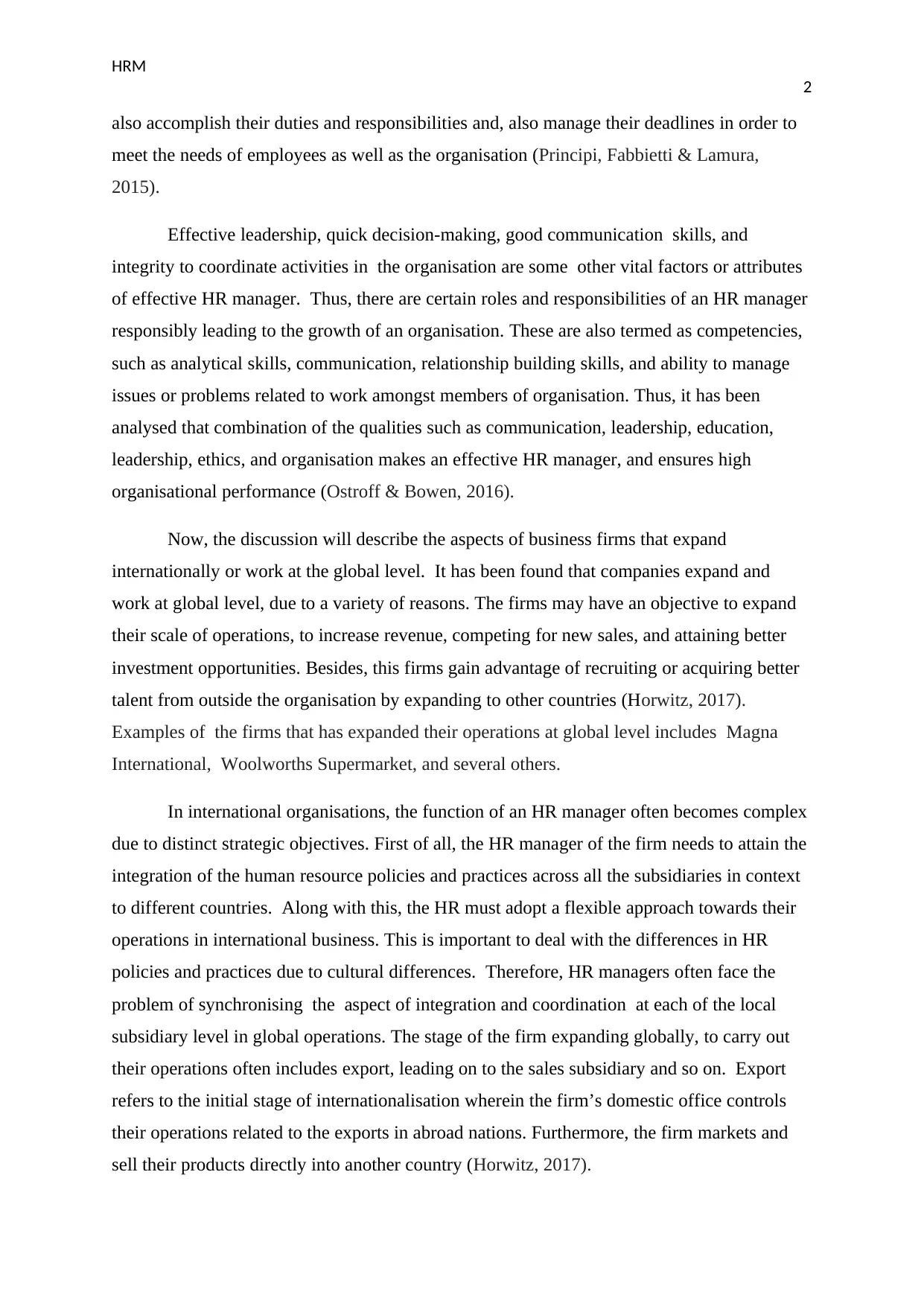
HRM
2
also accomplish their duties and responsibilities and, also manage their deadlines in order to
meet the needs of employees as well as the organisation (Principi, Fabbietti & Lamura,
2015).
Effective leadership, quick decision-making, good communication skills, and
integrity to coordinate activities in the organisation are some other vital factors or attributes
of effective HR manager. Thus, there are certain roles and responsibilities of an HR manager
responsibly leading to the growth of an organisation. These are also termed as competencies,
such as analytical skills, communication, relationship building skills, and ability to manage
issues or problems related to work amongst members of organisation. Thus, it has been
analysed that combination of the qualities such as communication, leadership, education,
leadership, ethics, and organisation makes an effective HR manager, and ensures high
organisational performance (Ostroff & Bowen, 2016).
Now, the discussion will describe the aspects of business firms that expand
internationally or work at the global level. It has been found that companies expand and
work at global level, due to a variety of reasons. The firms may have an objective to expand
their scale of operations, to increase revenue, competing for new sales, and attaining better
investment opportunities. Besides, this firms gain advantage of recruiting or acquiring better
talent from outside the organisation by expanding to other countries (Horwitz, 2017).
Examples of the firms that has expanded their operations at global level includes Magna
International, Woolworths Supermarket, and several others.
In international organisations, the function of an HR manager often becomes complex
due to distinct strategic objectives. First of all, the HR manager of the firm needs to attain the
integration of the human resource policies and practices across all the subsidiaries in context
to different countries. Along with this, the HR must adopt a flexible approach towards their
operations in international business. This is important to deal with the differences in HR
policies and practices due to cultural differences. Therefore, HR managers often face the
problem of synchronising the aspect of integration and coordination at each of the local
subsidiary level in global operations. The stage of the firm expanding globally, to carry out
their operations often includes export, leading on to the sales subsidiary and so on. Export
refers to the initial stage of internationalisation wherein the firm’s domestic office controls
their operations related to the exports in abroad nations. Furthermore, the firm markets and
sell their products directly into another country (Horwitz, 2017).
2
also accomplish their duties and responsibilities and, also manage their deadlines in order to
meet the needs of employees as well as the organisation (Principi, Fabbietti & Lamura,
2015).
Effective leadership, quick decision-making, good communication skills, and
integrity to coordinate activities in the organisation are some other vital factors or attributes
of effective HR manager. Thus, there are certain roles and responsibilities of an HR manager
responsibly leading to the growth of an organisation. These are also termed as competencies,
such as analytical skills, communication, relationship building skills, and ability to manage
issues or problems related to work amongst members of organisation. Thus, it has been
analysed that combination of the qualities such as communication, leadership, education,
leadership, ethics, and organisation makes an effective HR manager, and ensures high
organisational performance (Ostroff & Bowen, 2016).
Now, the discussion will describe the aspects of business firms that expand
internationally or work at the global level. It has been found that companies expand and
work at global level, due to a variety of reasons. The firms may have an objective to expand
their scale of operations, to increase revenue, competing for new sales, and attaining better
investment opportunities. Besides, this firms gain advantage of recruiting or acquiring better
talent from outside the organisation by expanding to other countries (Horwitz, 2017).
Examples of the firms that has expanded their operations at global level includes Magna
International, Woolworths Supermarket, and several others.
In international organisations, the function of an HR manager often becomes complex
due to distinct strategic objectives. First of all, the HR manager of the firm needs to attain the
integration of the human resource policies and practices across all the subsidiaries in context
to different countries. Along with this, the HR must adopt a flexible approach towards their
operations in international business. This is important to deal with the differences in HR
policies and practices due to cultural differences. Therefore, HR managers often face the
problem of synchronising the aspect of integration and coordination at each of the local
subsidiary level in global operations. The stage of the firm expanding globally, to carry out
their operations often includes export, leading on to the sales subsidiary and so on. Export
refers to the initial stage of internationalisation wherein the firm’s domestic office controls
their operations related to the exports in abroad nations. Furthermore, the firm markets and
sell their products directly into another country (Horwitz, 2017).
⊘ This is a preview!⊘
Do you want full access?
Subscribe today to unlock all pages.

Trusted by 1+ million students worldwide
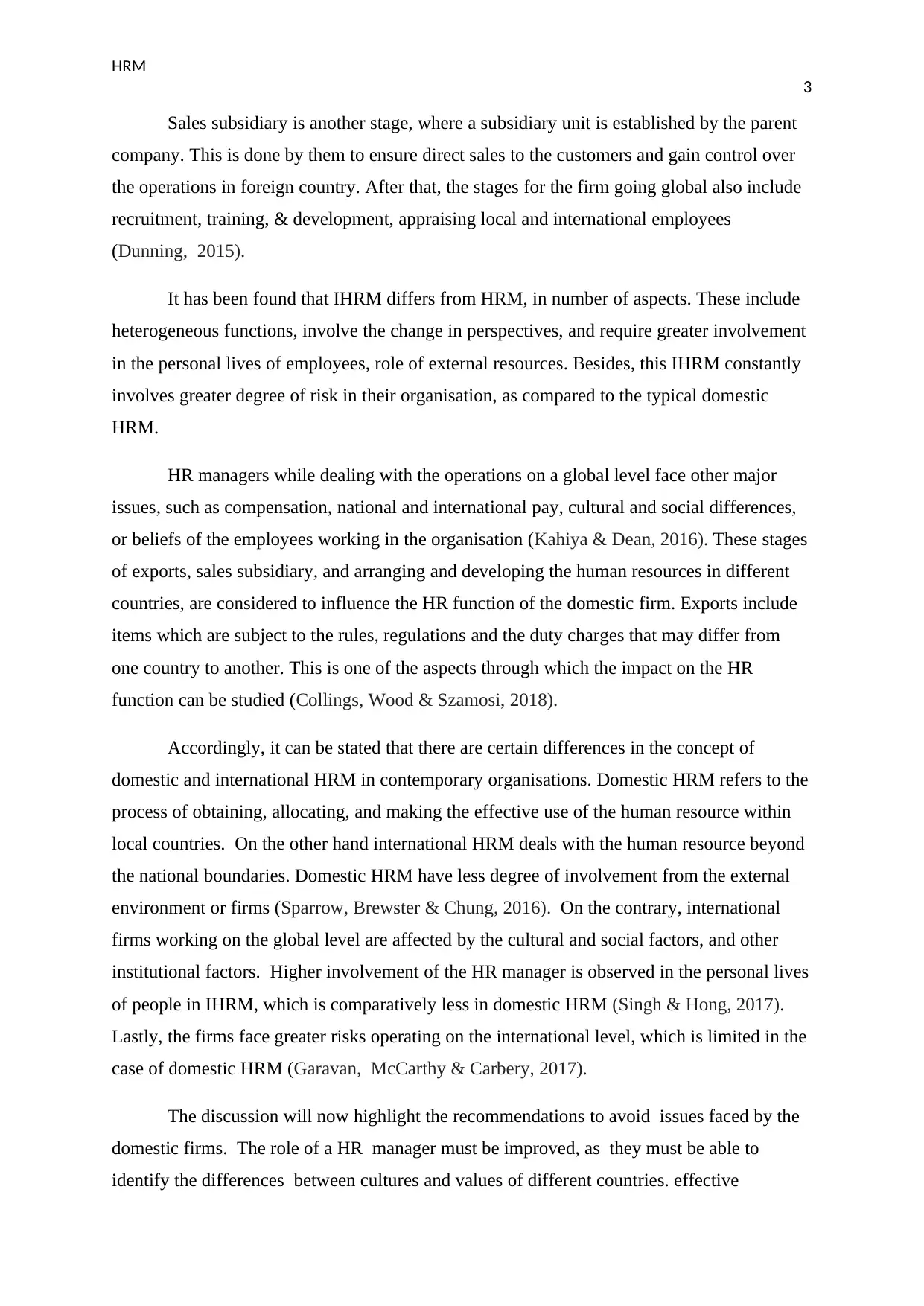
HRM
3
Sales subsidiary is another stage, where a subsidiary unit is established by the parent
company. This is done by them to ensure direct sales to the customers and gain control over
the operations in foreign country. After that, the stages for the firm going global also include
recruitment, training, & development, appraising local and international employees
(Dunning, 2015).
It has been found that IHRM differs from HRM, in number of aspects. These include
heterogeneous functions, involve the change in perspectives, and require greater involvement
in the personal lives of employees, role of external resources. Besides, this IHRM constantly
involves greater degree of risk in their organisation, as compared to the typical domestic
HRM.
HR managers while dealing with the operations on a global level face other major
issues, such as compensation, national and international pay, cultural and social differences,
or beliefs of the employees working in the organisation (Kahiya & Dean, 2016). These stages
of exports, sales subsidiary, and arranging and developing the human resources in different
countries, are considered to influence the HR function of the domestic firm. Exports include
items which are subject to the rules, regulations and the duty charges that may differ from
one country to another. This is one of the aspects through which the impact on the HR
function can be studied (Collings, Wood & Szamosi, 2018).
Accordingly, it can be stated that there are certain differences in the concept of
domestic and international HRM in contemporary organisations. Domestic HRM refers to the
process of obtaining, allocating, and making the effective use of the human resource within
local countries. On the other hand international HRM deals with the human resource beyond
the national boundaries. Domestic HRM have less degree of involvement from the external
environment or firms (Sparrow, Brewster & Chung, 2016). On the contrary, international
firms working on the global level are affected by the cultural and social factors, and other
institutional factors. Higher involvement of the HR manager is observed in the personal lives
of people in IHRM, which is comparatively less in domestic HRM (Singh & Hong, 2017).
Lastly, the firms face greater risks operating on the international level, which is limited in the
case of domestic HRM (Garavan, McCarthy & Carbery, 2017).
The discussion will now highlight the recommendations to avoid issues faced by the
domestic firms. The role of a HR manager must be improved, as they must be able to
identify the differences between cultures and values of different countries. effective
3
Sales subsidiary is another stage, where a subsidiary unit is established by the parent
company. This is done by them to ensure direct sales to the customers and gain control over
the operations in foreign country. After that, the stages for the firm going global also include
recruitment, training, & development, appraising local and international employees
(Dunning, 2015).
It has been found that IHRM differs from HRM, in number of aspects. These include
heterogeneous functions, involve the change in perspectives, and require greater involvement
in the personal lives of employees, role of external resources. Besides, this IHRM constantly
involves greater degree of risk in their organisation, as compared to the typical domestic
HRM.
HR managers while dealing with the operations on a global level face other major
issues, such as compensation, national and international pay, cultural and social differences,
or beliefs of the employees working in the organisation (Kahiya & Dean, 2016). These stages
of exports, sales subsidiary, and arranging and developing the human resources in different
countries, are considered to influence the HR function of the domestic firm. Exports include
items which are subject to the rules, regulations and the duty charges that may differ from
one country to another. This is one of the aspects through which the impact on the HR
function can be studied (Collings, Wood & Szamosi, 2018).
Accordingly, it can be stated that there are certain differences in the concept of
domestic and international HRM in contemporary organisations. Domestic HRM refers to the
process of obtaining, allocating, and making the effective use of the human resource within
local countries. On the other hand international HRM deals with the human resource beyond
the national boundaries. Domestic HRM have less degree of involvement from the external
environment or firms (Sparrow, Brewster & Chung, 2016). On the contrary, international
firms working on the global level are affected by the cultural and social factors, and other
institutional factors. Higher involvement of the HR manager is observed in the personal lives
of people in IHRM, which is comparatively less in domestic HRM (Singh & Hong, 2017).
Lastly, the firms face greater risks operating on the international level, which is limited in the
case of domestic HRM (Garavan, McCarthy & Carbery, 2017).
The discussion will now highlight the recommendations to avoid issues faced by the
domestic firms. The role of a HR manager must be improved, as they must be able to
identify the differences between cultures and values of different countries. effective
Paraphrase This Document
Need a fresh take? Get an instant paraphrase of this document with our AI Paraphraser
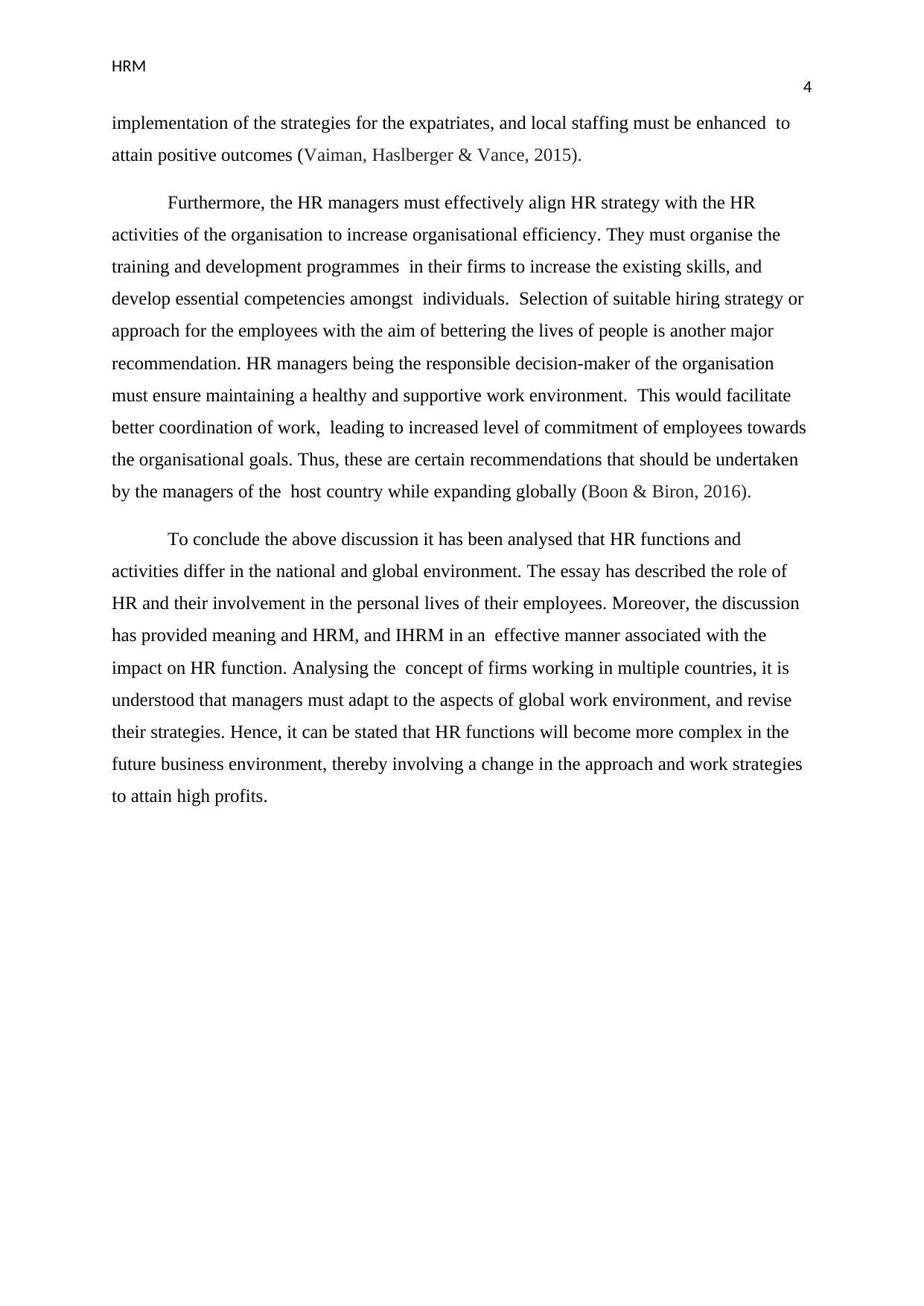
HRM
4
implementation of the strategies for the expatriates, and local staffing must be enhanced to
attain positive outcomes (Vaiman, Haslberger & Vance, 2015).
Furthermore, the HR managers must effectively align HR strategy with the HR
activities of the organisation to increase organisational efficiency. They must organise the
training and development programmes in their firms to increase the existing skills, and
develop essential competencies amongst individuals. Selection of suitable hiring strategy or
approach for the employees with the aim of bettering the lives of people is another major
recommendation. HR managers being the responsible decision-maker of the organisation
must ensure maintaining a healthy and supportive work environment. This would facilitate
better coordination of work, leading to increased level of commitment of employees towards
the organisational goals. Thus, these are certain recommendations that should be undertaken
by the managers of the host country while expanding globally (Boon & Biron, 2016).
To conclude the above discussion it has been analysed that HR functions and
activities differ in the national and global environment. The essay has described the role of
HR and their involvement in the personal lives of their employees. Moreover, the discussion
has provided meaning and HRM, and IHRM in an effective manner associated with the
impact on HR function. Analysing the concept of firms working in multiple countries, it is
understood that managers must adapt to the aspects of global work environment, and revise
their strategies. Hence, it can be stated that HR functions will become more complex in the
future business environment, thereby involving a change in the approach and work strategies
to attain high profits.
4
implementation of the strategies for the expatriates, and local staffing must be enhanced to
attain positive outcomes (Vaiman, Haslberger & Vance, 2015).
Furthermore, the HR managers must effectively align HR strategy with the HR
activities of the organisation to increase organisational efficiency. They must organise the
training and development programmes in their firms to increase the existing skills, and
develop essential competencies amongst individuals. Selection of suitable hiring strategy or
approach for the employees with the aim of bettering the lives of people is another major
recommendation. HR managers being the responsible decision-maker of the organisation
must ensure maintaining a healthy and supportive work environment. This would facilitate
better coordination of work, leading to increased level of commitment of employees towards
the organisational goals. Thus, these are certain recommendations that should be undertaken
by the managers of the host country while expanding globally (Boon & Biron, 2016).
To conclude the above discussion it has been analysed that HR functions and
activities differ in the national and global environment. The essay has described the role of
HR and their involvement in the personal lives of their employees. Moreover, the discussion
has provided meaning and HRM, and IHRM in an effective manner associated with the
impact on HR function. Analysing the concept of firms working in multiple countries, it is
understood that managers must adapt to the aspects of global work environment, and revise
their strategies. Hence, it can be stated that HR functions will become more complex in the
future business environment, thereby involving a change in the approach and work strategies
to attain high profits.
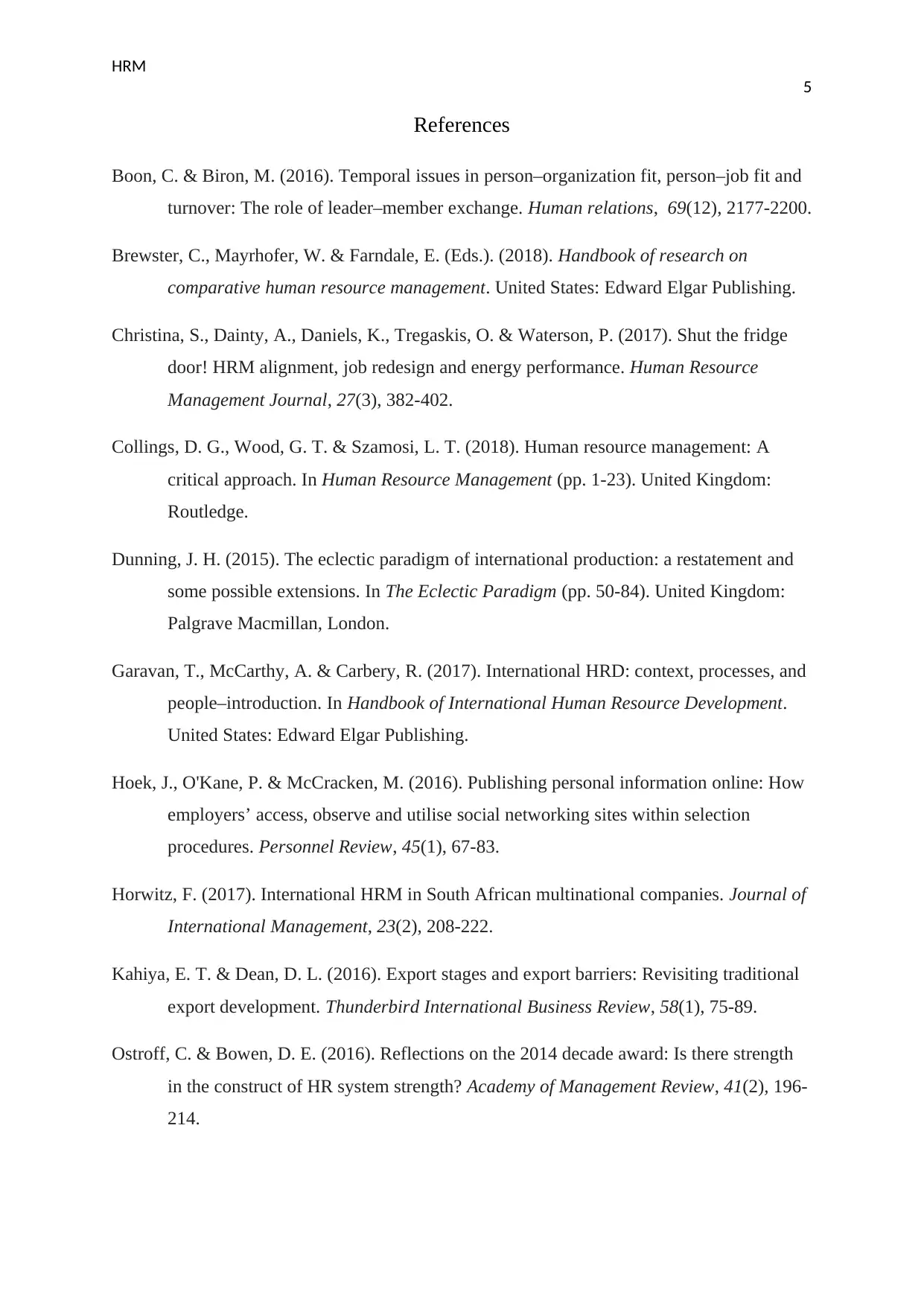
HRM
5
References
Boon, C. & Biron, M. (2016). Temporal issues in person–organization fit, person–job fit and
turnover: The role of leader–member exchange. Human relations, 69(12), 2177-2200.
Brewster, C., Mayrhofer, W. & Farndale, E. (Eds.). (2018). Handbook of research on
comparative human resource management. United States: Edward Elgar Publishing.
Christina, S., Dainty, A., Daniels, K., Tregaskis, O. & Waterson, P. (2017). Shut the fridge
door! HRM alignment, job redesign and energy performance. Human Resource
Management Journal, 27(3), 382-402.
Collings, D. G., Wood, G. T. & Szamosi, L. T. (2018). Human resource management: A
critical approach. In Human Resource Management (pp. 1-23). United Kingdom:
Routledge.
Dunning, J. H. (2015). The eclectic paradigm of international production: a restatement and
some possible extensions. In The Eclectic Paradigm (pp. 50-84). United Kingdom:
Palgrave Macmillan, London.
Garavan, T., McCarthy, A. & Carbery, R. (2017). International HRD: context, processes, and
people–introduction. In Handbook of International Human Resource Development.
United States: Edward Elgar Publishing.
Hoek, J., O'Kane, P. & McCracken, M. (2016). Publishing personal information online: How
employers’ access, observe and utilise social networking sites within selection
procedures. Personnel Review, 45(1), 67-83.
Horwitz, F. (2017). International HRM in South African multinational companies. Journal of
International Management, 23(2), 208-222.
Kahiya, E. T. & Dean, D. L. (2016). Export stages and export barriers: Revisiting traditional
export development. Thunderbird International Business Review, 58(1), 75-89.
Ostroff, C. & Bowen, D. E. (2016). Reflections on the 2014 decade award: Is there strength
in the construct of HR system strength? Academy of Management Review, 41(2), 196-
214.
5
References
Boon, C. & Biron, M. (2016). Temporal issues in person–organization fit, person–job fit and
turnover: The role of leader–member exchange. Human relations, 69(12), 2177-2200.
Brewster, C., Mayrhofer, W. & Farndale, E. (Eds.). (2018). Handbook of research on
comparative human resource management. United States: Edward Elgar Publishing.
Christina, S., Dainty, A., Daniels, K., Tregaskis, O. & Waterson, P. (2017). Shut the fridge
door! HRM alignment, job redesign and energy performance. Human Resource
Management Journal, 27(3), 382-402.
Collings, D. G., Wood, G. T. & Szamosi, L. T. (2018). Human resource management: A
critical approach. In Human Resource Management (pp. 1-23). United Kingdom:
Routledge.
Dunning, J. H. (2015). The eclectic paradigm of international production: a restatement and
some possible extensions. In The Eclectic Paradigm (pp. 50-84). United Kingdom:
Palgrave Macmillan, London.
Garavan, T., McCarthy, A. & Carbery, R. (2017). International HRD: context, processes, and
people–introduction. In Handbook of International Human Resource Development.
United States: Edward Elgar Publishing.
Hoek, J., O'Kane, P. & McCracken, M. (2016). Publishing personal information online: How
employers’ access, observe and utilise social networking sites within selection
procedures. Personnel Review, 45(1), 67-83.
Horwitz, F. (2017). International HRM in South African multinational companies. Journal of
International Management, 23(2), 208-222.
Kahiya, E. T. & Dean, D. L. (2016). Export stages and export barriers: Revisiting traditional
export development. Thunderbird International Business Review, 58(1), 75-89.
Ostroff, C. & Bowen, D. E. (2016). Reflections on the 2014 decade award: Is there strength
in the construct of HR system strength? Academy of Management Review, 41(2), 196-
214.
⊘ This is a preview!⊘
Do you want full access?
Subscribe today to unlock all pages.

Trusted by 1+ million students worldwide
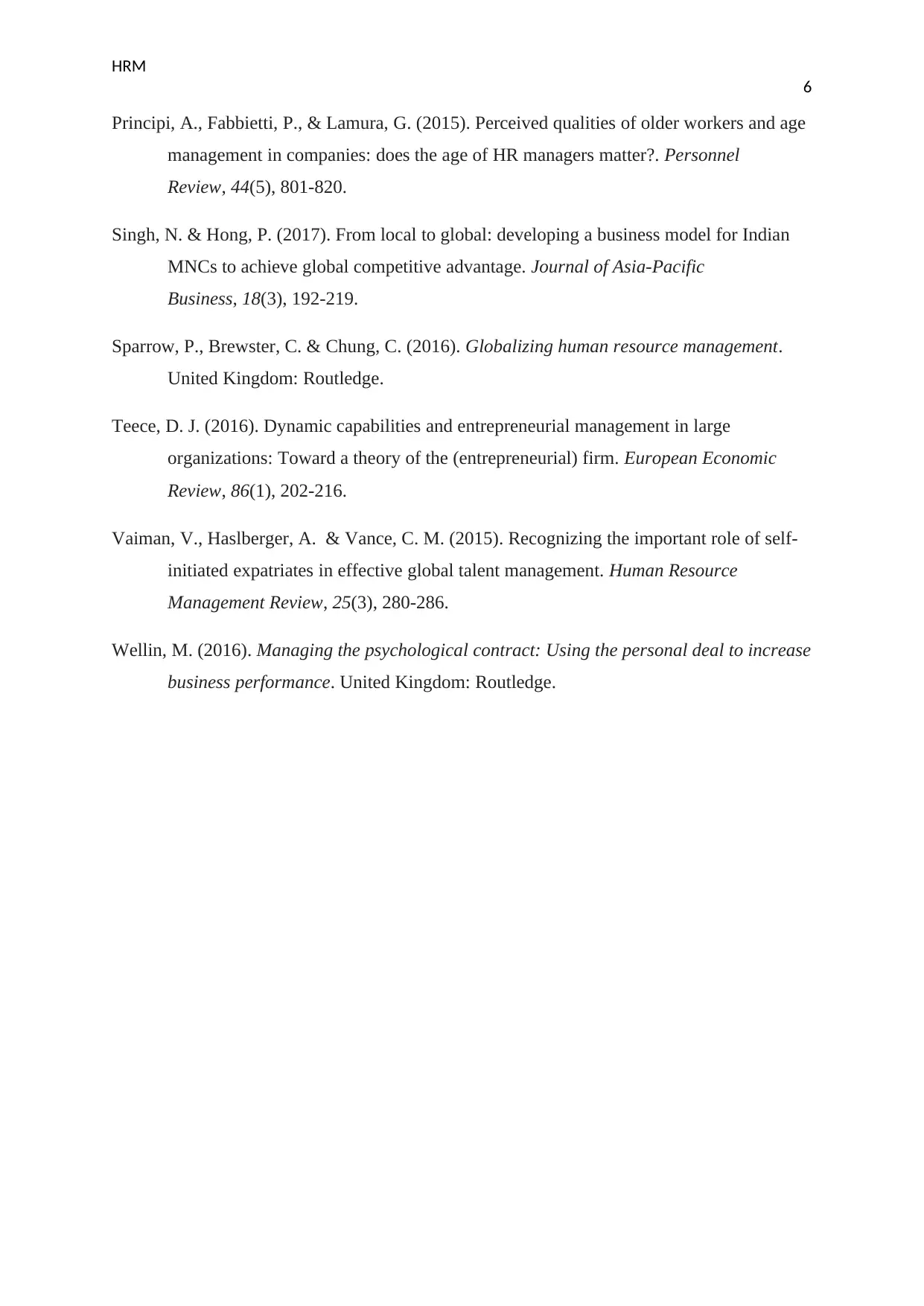
HRM
6
Principi, A., Fabbietti, P., & Lamura, G. (2015). Perceived qualities of older workers and age
management in companies: does the age of HR managers matter?. Personnel
Review, 44(5), 801-820.
Singh, N. & Hong, P. (2017). From local to global: developing a business model for Indian
MNCs to achieve global competitive advantage. Journal of Asia-Pacific
Business, 18(3), 192-219.
Sparrow, P., Brewster, C. & Chung, C. (2016). Globalizing human resource management.
United Kingdom: Routledge.
Teece, D. J. (2016). Dynamic capabilities and entrepreneurial management in large
organizations: Toward a theory of the (entrepreneurial) firm. European Economic
Review, 86(1), 202-216.
Vaiman, V., Haslberger, A. & Vance, C. M. (2015). Recognizing the important role of self-
initiated expatriates in effective global talent management. Human Resource
Management Review, 25(3), 280-286.
Wellin, M. (2016). Managing the psychological contract: Using the personal deal to increase
business performance. United Kingdom: Routledge.
6
Principi, A., Fabbietti, P., & Lamura, G. (2015). Perceived qualities of older workers and age
management in companies: does the age of HR managers matter?. Personnel
Review, 44(5), 801-820.
Singh, N. & Hong, P. (2017). From local to global: developing a business model for Indian
MNCs to achieve global competitive advantage. Journal of Asia-Pacific
Business, 18(3), 192-219.
Sparrow, P., Brewster, C. & Chung, C. (2016). Globalizing human resource management.
United Kingdom: Routledge.
Teece, D. J. (2016). Dynamic capabilities and entrepreneurial management in large
organizations: Toward a theory of the (entrepreneurial) firm. European Economic
Review, 86(1), 202-216.
Vaiman, V., Haslberger, A. & Vance, C. M. (2015). Recognizing the important role of self-
initiated expatriates in effective global talent management. Human Resource
Management Review, 25(3), 280-286.
Wellin, M. (2016). Managing the psychological contract: Using the personal deal to increase
business performance. United Kingdom: Routledge.
1 out of 7
Related Documents
Your All-in-One AI-Powered Toolkit for Academic Success.
+13062052269
info@desklib.com
Available 24*7 on WhatsApp / Email
![[object Object]](/_next/static/media/star-bottom.7253800d.svg)
Unlock your academic potential
Copyright © 2020–2026 A2Z Services. All Rights Reserved. Developed and managed by ZUCOL.





